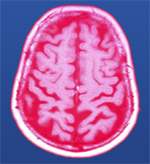
In its first type of research, US scientists have found that weight gain and sexual desire of a person can be early predicted through functional Magnetic Resonance Imaging (fMRI).
The scientists at department of psychological and brain sciences have demonstrated a connection between fMRI brain responses to appetite-driven cues and future behaviour in their research.v
According to lead scientists and coauthor of the study, Todd Heatherton, "This is one of the first studies in brain imaging that uses the responses observed in the scanner to predict important, real-world outcomes over a long period of time."
"Using brain activity to predict a consequential behaviour outside the scanner is pretty novel," he noted.
Using fMRI, the researchers targeted a region of the brain known as the nucleus accumbens, often referred to as the brain's "reward center," in a group of incoming first-year college students.
While undergoing scans, the subjects viewed images of animals, environmental scenes, appetizing food items, and people. Six months later, their weight and responses to questionnaires regarding interim sexual behaviour were compared with their previously recorded weight and brain scan data.
"The people whose brains responded more strongly to food cues were the people who went on to gain more weight six months later," explained Kathryn Demos, first author on the paper.
The correlation between strong food image brain responses and weight gain was also present for sexual images and activity.
"Just as cue reactivity to food images was investigated as potential predictors of weight gain, cue reactivity to sexual images was used to predict sexual desire," the authors reported.
The study stresses "material specificity," noting that the participants who responded to food images gained weight but did not engage in more sexual behaviour, and vice versa. The authors go on to say that none of the non-food images predicted weight gain.
The researchers note that the first step toward controlling cravings may be an awareness of how much you are affected by specific triggers in the environment, such as the arrival of the dessert tray in a restaurant.
The study has been published April 18, 2012, in The Journal of Neuroscience.
--With ANI Inputs--
null
|
|


Comments: